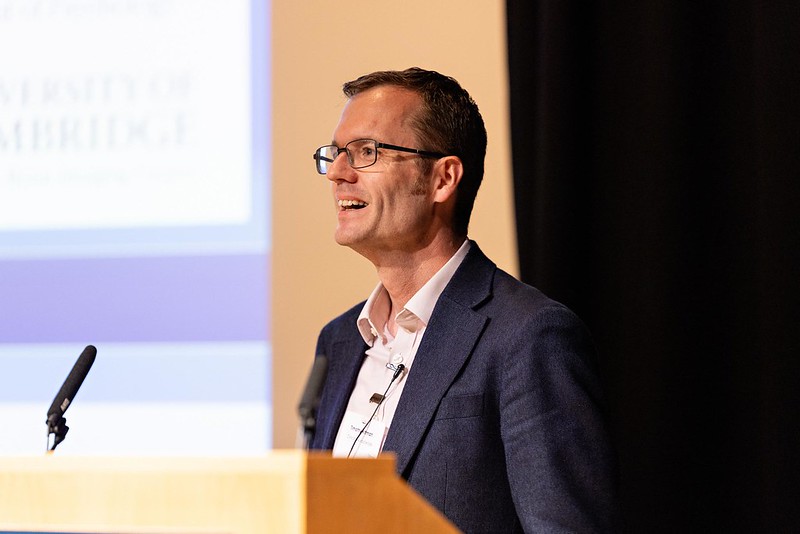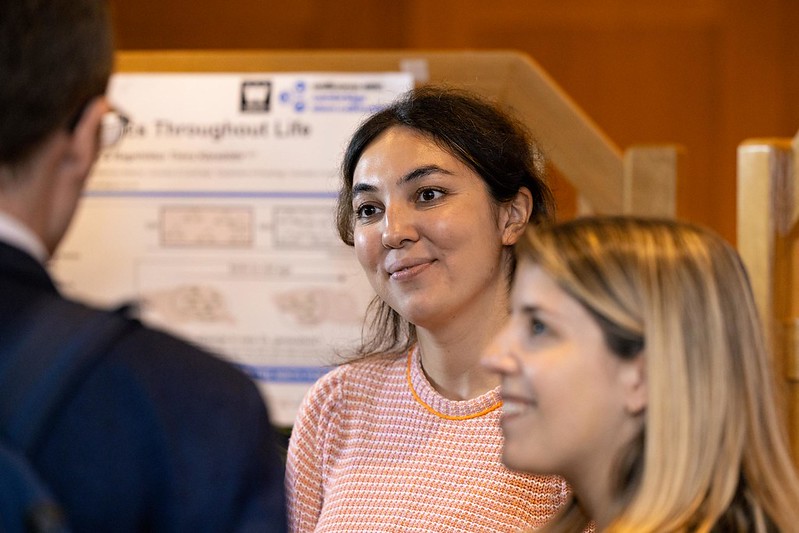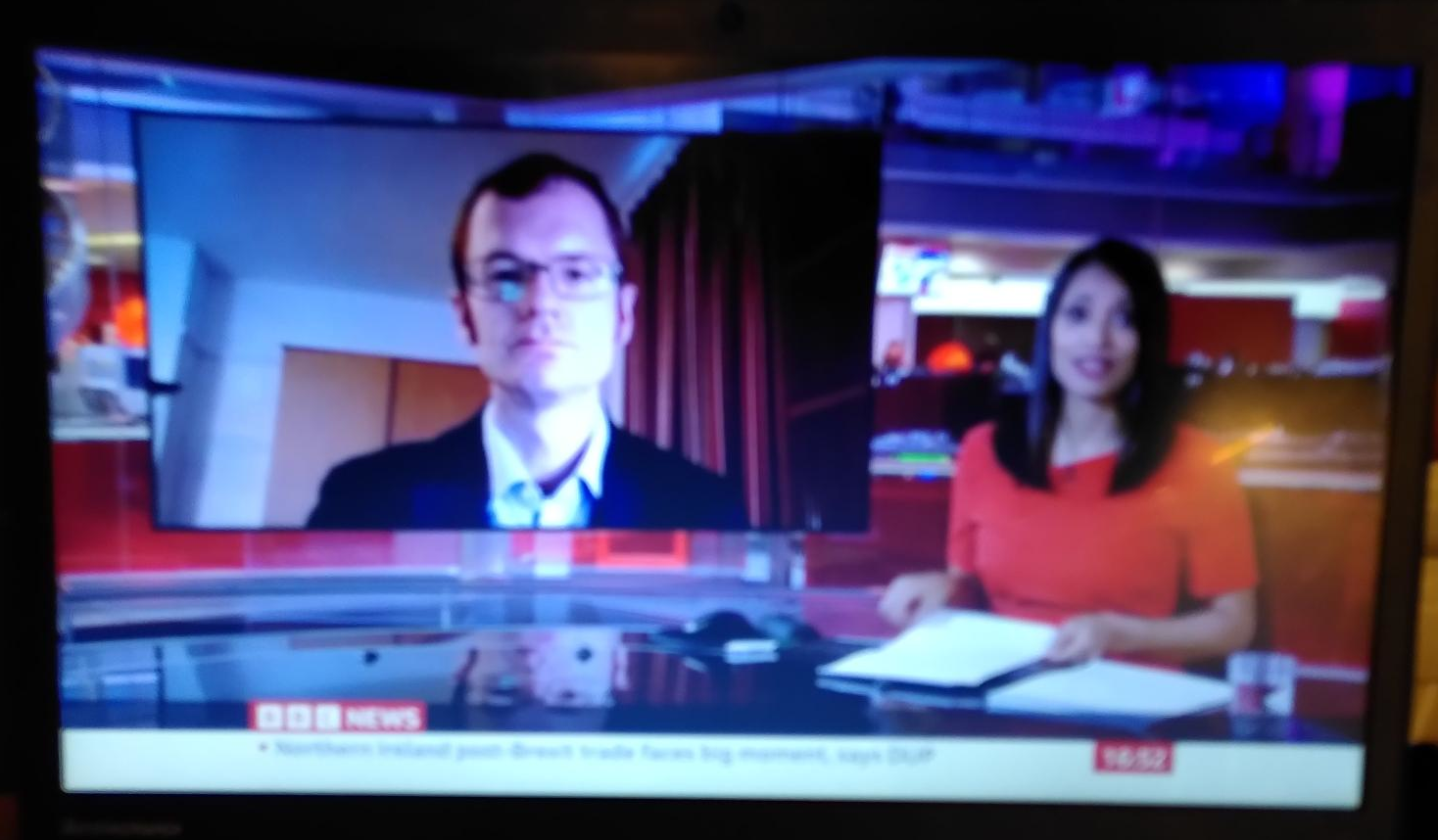News from our lab
Latest news
Neuroscience symposium 26th September 2023
Each year the Cambridge neuroscience department holds a whole day symposium. This year’s topic was multidisciplinary work in dementia - exactly what we do! It was an amazing day, with a huge variety of talks stretching from fundamental chemistry through to clinical research, and everything in between. Tim gave a talk with Zoe Kourtzi about our work on the QMIN-MC study.


September 2023
Many congratulations to David Whiteside who successfully defended his PhD thesis! David is the lab’s first fully fledged PhD student, with Tanrada and Marion due to submit in the next few months. David has shown us all how to do it with a record 1hr 40 mins viva - that must be one of the shortest on record! David’s work has fundamentally changed how we think about the relationship between structural change in neurodegeneration and its impact on the brain’s functional networks. In particular, David has shown the importance of examining dynamic connectivity (i.e. changes in functional networks over time), and how changes in the brain’s structure can result in changes to functional networks in other parts of the brain.
August 2023
This week has seen the online preview for a major review, led by Tim and with previous lab academic doctor, Robin Borchert. The review is published in Alzheimer’s and Dementia and looks at research articles on artificial intelligence applied to neuroimaging for potential use in memory clinics, either for diagnosis or for prognosis. We found 255 papers presenting a range of different AI algorithms, from simple to complex approaches. The more complex algorithms (i.e. deep learning models) are becoming more widely used. However, many of the important steps that need to be in place for these algorithms to reach the clinic have not been done, for example validating the results in an independent dataset, or in a real world situation such as the QMIN-MC study. The field has benefited from `big data’, but many of the studies we found used the same dataset which is US based and not very diverse. These problems have been suspected in the field of AI and dementia, but we have now been able to shine a light on what needs to be done to move things forward.
This work is part of a series of reviews under the banner of the Deep Dementia Phenotyping (DEMON) network. Tim leads the DEMON Imaging Working Group, and this paper has been a truly international effort with contributions from around the globe. There are other review papers in the special issue on: experimental models, drug discovery and trials optimization, genetics and omics, biomarkers, prevention, applied models and digital health, and methods optimization (I’ll add links as they become available).
July 2023
Our paper collaborating with Tiago Azevedo and Pietro Lio from the computer science department is finally out in Nature Communications Medicine. It’s a really exciting paper where we have been able to identify people at high risk of Alzheimer’s disease using artificial intelligence and brain scans. Tiago and Tim have written an accessible blog about our work available on the Nature Neuroscience Community site.
A few of us have taken a trip to Montreal for the Organisation of Human Brain Mapping meeting. Marion, Marcella, Tim and David have posters, and David gave a wonderful talk about dynamic connectivity in Frontotemporal Dementia (see the paper here). Amir was invited for a talk, but unfortunately could not attend because of visa issues - having been at the meeting it seems that unfortunately he is not the only researcher to have had this problem. It has been great to meet up with collaborators from around the world, and to meet new people. We’ll be coming home with lots of ideas!
March 2023
Tim was on the BBC news recently talking about Bruce Willis and Frontotemporal Dementia. We are very sorry for Bruce and his family, but we hope to use the situation to raise awareness of Frontotemporal Dementia and other non-Alzheimer disease neurodegenerative conditions. Tim was able to talk about the work in Cambridge on Frontotemporal Dementia and related diseases.

January 2023
We’re excited that the first round of data from the QMIN-MC study is now available through Dementia Platform UK. This means that researchers can use the brain scans and cognitive tests from the first 350 people who have been recruited to the study to design better tests for the diagnosis and prognosis of dementia. This is just a first step. The number of people recruited continues to grow (we’ve recently passed 500!), and we’re talking to new memory clinics almost every week to expand the sites involved in the study.
December 2022
Our new paper published in Alzheimer’s and Dementia of work by David Whiteside investigates changes that happen in the brains of people with genetic mutations that cause frontotemporal dementia. With the development of new treatments and ongoing clinical trials it is important to be able to predict when these patients will develop dementia. However, clinicians currently often find disease onset difficult to estimate. We used data from the Cambridge Centre for Frontotemporal Dementia and the Genetic Frontotemporal Dementia Initiative, an important international study of people with genetic FTD, to help us tackle this clinical challenge. We identified a characteristic FTD pattern of altered ‘brain states’ using task-free functional magnetic resonance imaging. We showed that these changes not only correlate with disease severity, but also predict the rate of cognitive decline in mutation carriers and conversion to dementia. These findings have important implications for stratifying people based on their prognosis, for example in clinical trials.
October 2022
Our newest paper looks at how early people develop symptoms across a range of neurodegenerative diseases. We used data from half a million people in the UK biobank studied, and followed them over time. For those who developed dementia we looked back to see how early it was possible to detect changes. In some groups this was as early as 9 years. The changes we found seem to be specific for certain diseases, for example people with Alzheimer’s disease has worse cognitive flexibility and memory, whereas people with PSP had worse cognitive flexibility and far more falls. These findings open up the possibility of very early screening and a window of opportunity to stop or slow down the disease by recruiting people to prevention or treatment trials. Pre-diagnostic cognitive and functional impairment in multiple sporadic neurodegenerative diseases.
Hear Tim talking about this work on the Naked Scientist podcast.
April 2022
We are delighted to have contributed to Brain charts for the human lifespan published in Nature. This has been a hugely collaborative study involving many researchers from around the world. It is a huge step forward in understanding how the brain changes over the course of a person’s life.
Articles
Articles about early detection of dementia
The Guardian https://www.theguardian.com/society/2022/oct/13/signs-of-dementia-may-be-detectable-nine-years-before-diagnosis-study
Articles about AI in memory clinics
BBC https://www.bbc.co.uk/news/health-57934589
The Guardian https://www.theguardian.com/society/2021/aug/10/artificial-intelligence-could-be-used-to-diagnose-dementia
The Telegraph https://www.telegraph.co.uk/news/2021/08/10/artificial-intelligence-could-diagnose-dementia-day/
The Independent https://www.independent.co.uk/news/health/ai-dementia-diagnosis-brain-scans-b1899939.html
The Times https://www.thetimes.co.uk/article/ai-could-diagnose-dementia-before-symptoms-show-6c9jx9sdl
University of Cambridge https://www.cam.ac.uk/stories/AIdementia
The Alan Turing Institute https://www.turing.ac.uk/news/ai-could-detect-dementia-after-single-brain-scan
PharmaPhorum https://pharmaphorum.com/news/cambridge-teams-says-ai-could-diagnose-dementia-with-one-scan/
The Northern Echo https://www.thenorthernecho.co.uk/news/national/19502716.scientists-trial-ai-system-diagnose-dementia-one-scan/
Geriatric Medicine Journal https://www.gmjournal.co.uk/artificial-intelligence-could-diagnose-dementia-after-a-single-brain-scan
Cambridge Biomedical Campus https://cambridge-biomedical.com/news-and-updates/ai-to-speed-up-dementia-diagnosis/
Cambridge Independent https://www.cambridgeindependent.co.uk/news/addenbrooke-s-patients-in-trial-using-ai-to-diagnose-alzheim-9211749/
digitalhealth https://www.digitalhealth.net/2021/08/addenbrookes-hospital-ai-dementia/
The European Times https://www.europeantimes.news/amp/2021/09/artificial-intelligence-can-detect-dementia-years-before-symptoms-appear/
Artificial Intelligence in Medicine https://ai-med.io/more-news/cambridge-team-claim-ai-can-diagnose-dementia-with-one-scan/
Videos and podcasts
The Naked Scientists podcast “Spotting signs of dementia early” https://www.thenakedscientists.com/articles/interviews/spotting-signs-dementia-early
SiLVR Adventures podcast “Dementia Futures” https://www.youtube.com/watch?v=Rwhg3S53NPI
Alzheimer’s Research UK “You’re Amazing Brain – Dementia Explained” https://www.youtube.com/watch?v=fP7u6wwbsZo
Normal? Festival of the Brain http://what-is-normal.info/normal-is-a-festival-of-the-brain/
Neurology of Power: People, Power and a Pandemic https://www.youtube.com/watch?v=VoZFj9QLgTM
